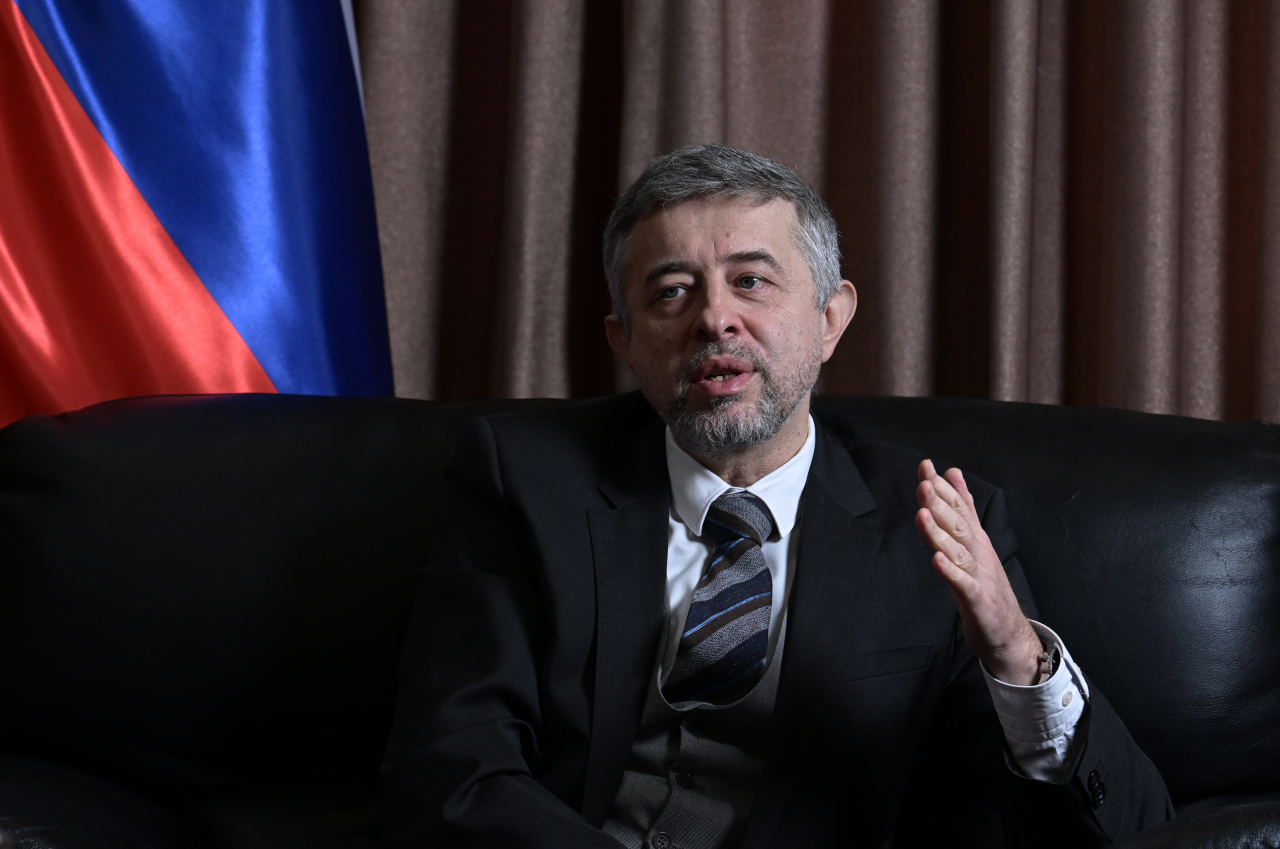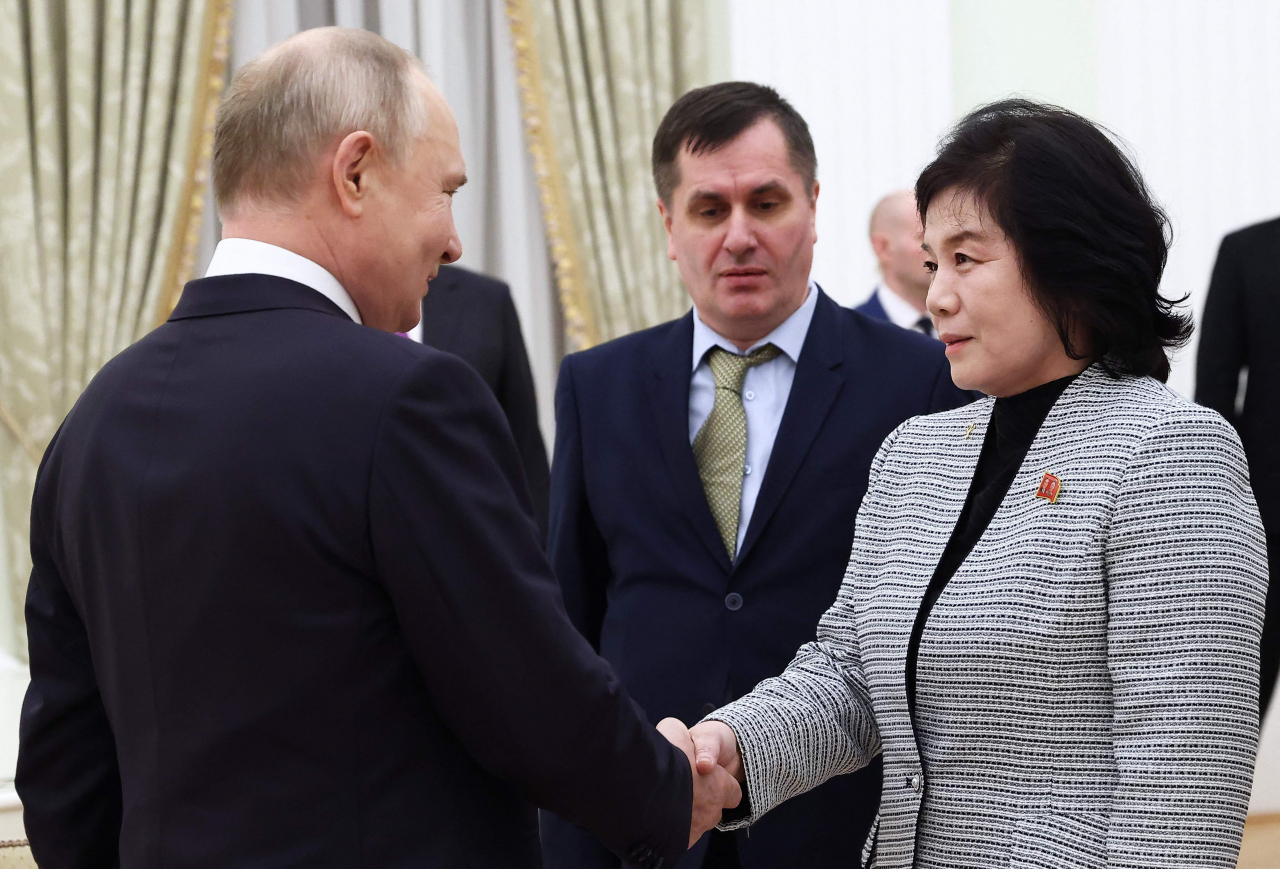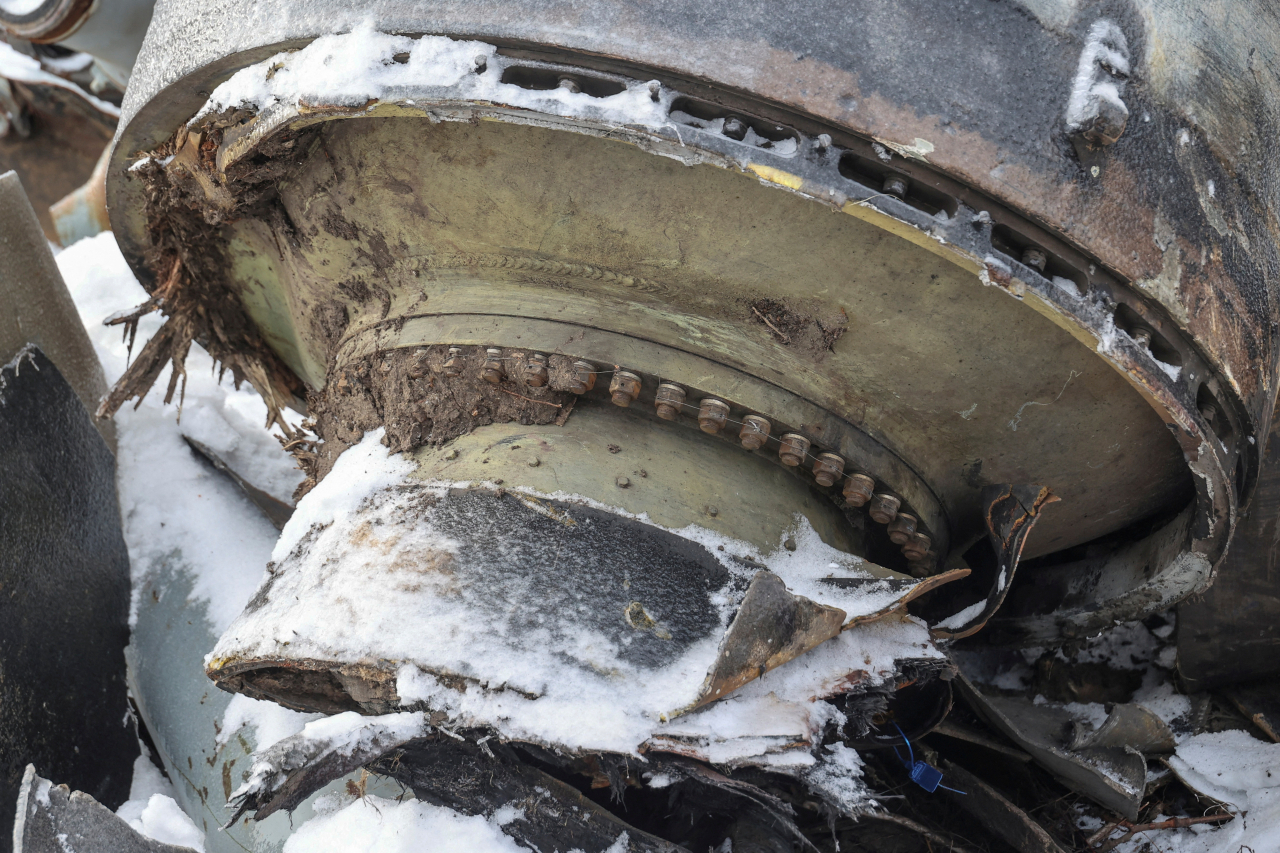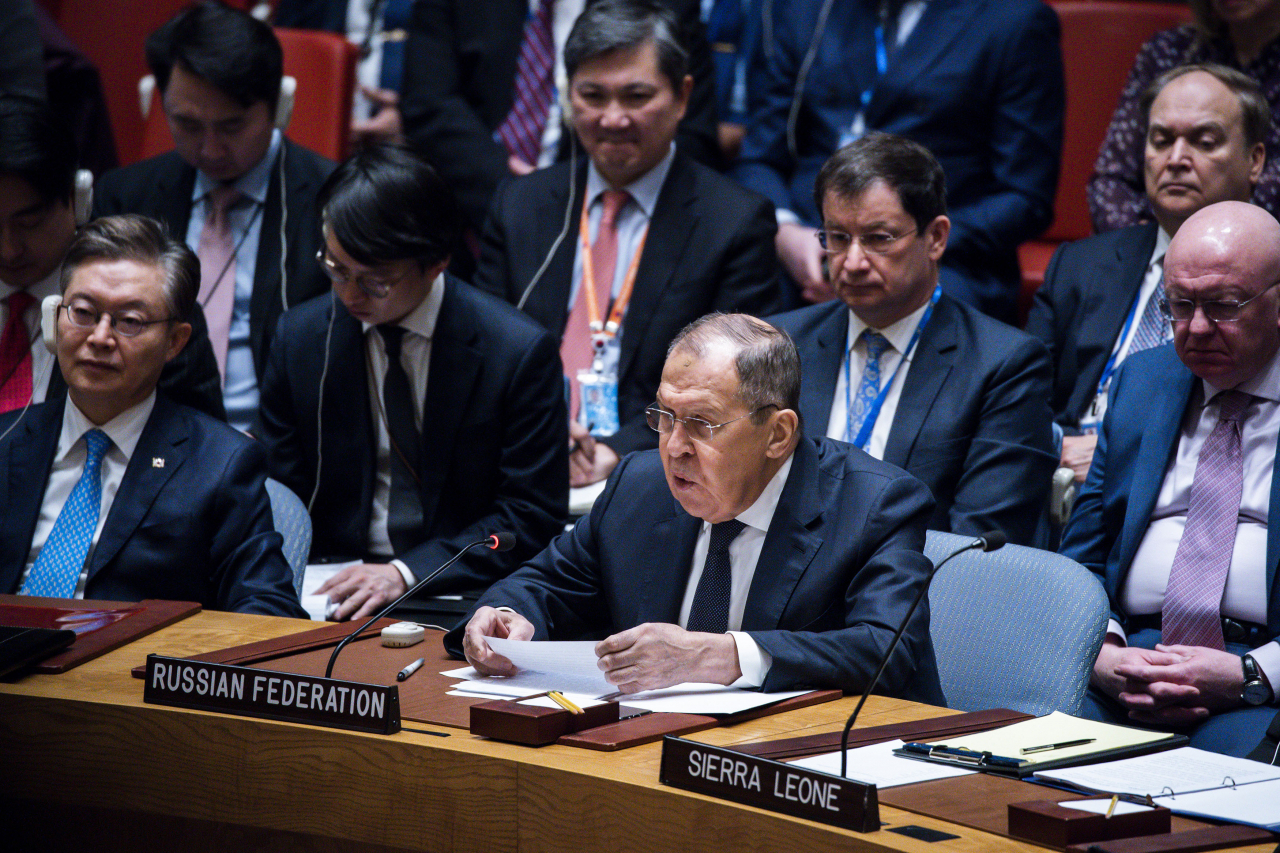[Herald Interview] Ties 'turbulent,' but ball in Seoul's court: Russian Ambassador
Moscow's top envoy says Russia in 'unique position' to foster ties with both Koreas; denies NK arms deals
By Ji Da-gyum, Sanjay KumarPublished : Jan. 24, 2024 - 14:43

South Korea and Russia are currently in a "turbulent" place, but the future will be different if Seoul takes steps to stabilize bilateral ties, according to the new Russian Ambassador to Seoul Georgy Zinoviev.
"We perceive that the ball is in the (South) Korean court. So, we are ready when our (South) Korean partners are ready," the ambassador in an interview with The Korea Herald in Seoul on Monday.
"But, we are not going to enforce or try to impose any goodwill on our Korean friends. Whenever you are ready, we are ready, but we're not running after anybody, asking them to be friends with us. Those who want to be friends with us can be friends with us."
Bilateral ties between South Korea and Moscow reached an all-time low following the outbreak of Russia's war against Ukraine in February 2022.
South Korea's Foreign Ministry was unable to respond to The Korea Herald's request for comment on Zinoviev's remarks.
However, the Foreign Ministry on Wednesday reiterated its basic stance, underscoring that "both sides, not just Korea but also Russia, should put effort into managing the bilateral relationship." The ministry further explained the Yoon Suk Yeol government is aware of the significance of Korea-Russia ties and is maintaining necessary communications.
Speaking at his inauguration ceremony this month, South Korean Foreign Minister Cho Tae-yul candidly acknowledged the challenging nature of expecting significant progress in the relationship between Korea and Russia, citing unresolved fundamental issues regarding the war in Ukraine as a key obstacle to any breakthrough in diplomatic ties.
The Yoon government, committed to value-based diplomacy that strives for global solidarity based on universal values and a rule-based international order, has joined in international sanctions against Russia. In response, Moscow publicly warned of retaliatory measures against Seoul.
"I would agree that the situation is turbulent, and it is not the way that we envisaged bilateral ties some time ago," Zinoviev said. "So, I can say that ties are not as we hope them to be ... but at the same time, they could be worse than they are now."

Stabilization first
The lack of high-level engagements between South Korea and Russia stands in stark contrast to the dynamic and active exchanges observed between Russia and North Korea. This includes North Korean Foreign Minister Choe Son-hui’s trip to Moscow last week and her meeting with President Vladimir Putin, which many view as an overture for the widely anticipated visit of the Russian leader to Pyongyang.
"Obviously, we are not at the point now where we can make any preparations for (those) kind of bilateral high-level exchanges," Zinoviev said when asked if Putin has any plans to visit South Korea.
If it were to be realized, the trip would be the Russian president's first visit to North Korea in 24 years. Putin has visited South Korea more frequently than he has visited the North, according to the ambassador.
Russian presidents, including three trips by Putin, visited South Korea six times from 1991 to 2013. Putin visited North Korea once back in July 2002, marking the only instance of a Russian leader making a trip to the country. In contrast, North Korean leaders have officially made trips to Russia 14 times for summits.
"We are at a juncture (where we first need) to stabilize our relations and prevent further deterioration. But we can hope for a better future for our ties in the coming days. So, once we can stabilize and normalize them, we can work on their further development," Zinoviev said.
"Then, as it is said, 'never say never.' We will see what the future will bring us. I do hope that it will bring perspective, and positive development for our two countries."
When asked about how Seoul and Moscow can normalize and stabilize bilateral ties at this juncture, Zinoviev said, "I think that the first thing that we both could do is to refrain from further steps that could damage our cooperation."
The ambassador cited South Korea's announcement that it would expand the list of items subject to export restrictions to Russia in December, adding 682 more items, as an example of such actions.
"Steps like that, of course, do not lead to any positive momentum in bilateral ties."
Zinoviev also clarified what Russia would consider a red line that South Korea should not cross.
"For us, a very negative development would be the shift or change in the Korean current stand that refrains from providing lethal military equipment to the Ukrainian regime," Zinoviev said.
The ambassador suggested that the current situation of the Ukraine war is different and that the global context of the conflict has also changed when compared to 2023 or 2022.
"So, I do hope that keeping in mind the prospects of further developments around the Ukrainian issue, the position of our Korean partners will remain the same as it is now."

Arms transactions
Zinoviev, however, denied Russia's acquisition of ballistic missiles from North Korea, countering mounting criticisms by the US, Ukraine, and other nations, who asserted that North Korean missiles had been used in attacks on Ukraine in December and this month.
In January, foreign ministers from 48 countries, including South Korea, and the European Union, issued a joint statement condemning North Korea's export of ballistic missiles and Russia's recent use of them in its assault on war-torn Ukraine, expressing their condemnation in the "strongest possible terms."
Ambassadors to the UN from 46 countries and the EU also criticized the arms transactions, which violate multiple UN Security Council resolutions, in another joint statement issued Monday.
"Our position is that they are groundless. If there is any proof, we would like to see them and hear about them," Zinoviev said. "If there is any proof, please use the proper channels to address them."
Zinoviev clarified that the appropriate channel for discussions of such proof is the 1718 Sanctions Committee, responsible for overseeing the implementation of Security Council resolutions imposed on North Korea.
On growing concerns from the international community over the closer alignment between Russia and North Korea, Zinoviev said, "The DPRK is a friendly nation for us," using the acronym for North Korea's official name, the Democratic People's Republic of Korea.
North Korea has endorsed Russia's position on Ukrainian issues, according to Zinoviev. The Kim Jong-un regime acknowledged the self-proclaimed Donetsk and Luhansk People's Republics in the Donbas region in eastern Ukraine as independent states. Additionally, North Korea also backed Russia's declared annexation of four parts of Ukrainian territory.
"We have that in mind when we conduct our international activities," he said. "So, with that kind of behavior from our North Korean friends and neighbors, it is only natural that we are willing to promote ties with them."

'Ever-present neighbors'
To put bilateral ties with South Korea back on track, the ambassador suggested a phased approach, stressing that "Russia could be in a unique position that can enjoy very good ties with both sides of the Korean Peninsula." Not many countries can do that, he said, naming only Russia and China as nations who have such a unique position.
"We need first to stabilize (bilateral relations), to refrain from further making them deteriorate, and then take some steps in practical exchanges and practical decisions to facilitate our cooperation," he said.
Seoul and Moscow could initiate practical measures by reinstating direct intergovernmental exchanges and fostering dialogues that align with the preferences of the South Korean side.
The exchanges might include activating the Korea-Russia Joint Commission on Economic, Scientific and Technological Cooperation, which is led by deputy prime ministers and tackles a spectrum of economic cooperation matters between the two nations, encompassing trade, infrastructure, industry, and science and technology. The last meeting of the commission took place virtually in 2021.
"So, if we could revive some dialogue at the working level and then between the relevant governmental agencies, I think it could be useful for reviving our practical collaboration as well. Again, that work was not stopped by the Russian side," Zinoviev said.
Another "relatively easy" way to improve ties is to resume the operation of direct flights between the two nations to enhance people-to-people exchanges, he added.
Amid concerns over local airport operations and safety issues arising from the war in Ukraine, South Korean airlines suspended passenger flights to Russia in March 2022.
Zinoviev said that the US sanction, which severed the direct air route between South Korea and Russia, is his concern because it has affected exchanges of people between the two countries.
"But I think we were ready to be flexible, keeping in mind the need for people-to-people (exchanges) to expand," he said. "I will just repeat that we will be ready as soon as the Korean side is ready."
Moscow's top envoy to Seoul advocated for a considerate, long-term approach, emphasizing the unalterable geographic proximity between Russia and South Korea.
"You do not choose your neighbors. We'll be living next door to each other. We (have been) used to (it) for many decades. We are now, and in the years to come, I think Russia will always be a close neighbor to Korea," he said.
"That is the factor ... that we need to keep in mind nowadays when relations are a bit turbulent. We need to think about the future and not (take) drastic steps that could influence our future relationship."





















